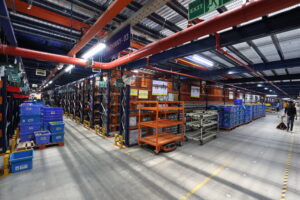Roshan Senapati, Head of Marketing, BonV Technology, shares key insights on how strategic marketing drives growth in logistics. He discusses customer retention, data-driven decisions, and content strategies essential for enhancing brand recognition and fostering loyalty.

A successful logistics marketing strategy blends traditional and innovative approaches
In the B2B logistics sector, Roshan Senapati underscores the pivotal role marketing plays in developing and executing effective promotional strategies. He emphasises that marketing is essential in communicating a company’s unique value propositions and establishing strong relationships with potential clients. According to Senapati, a successful marketing strategy in logistics requires a combination of traditional and innovative approaches to stay competitive and relevant in an evolving market.
Customer retention
Senapati points out that marketing extends beyond customer acquisition, highlighting its importance for customer retention and loyalty. He advocates for personalised communication and active relationship management as critical elements in retaining clients. By continuously analysing customer insights and optimising solutions, such as delivery routes, companies can enhance customer satisfaction. Senapati believes that these efforts are crucial in building long-term partnerships and reducing customer churn in the highly competitive logistics industry.
Content strategy
Content marketing is another area where Senapati sees significant value in promoting logistics services. He stresses the importance of understanding the target audience’s pain points and creating informative, valuable content tailored to their needs. Senapati’s strategy includes utilising various content formats, such as blogs, case studies, and videos, while incorporating industry trends and updates. He also emphasises the importance of search engine optimisation (SEO) to improve content visibility, making it easier for potential clients to find relevant information. For Senapati, engaging content not only attracts leads but also positions the company as a thought leader in the logistics sector.
Data-Driven marketing
Senapati recognises the integral role of data analytics and market research in shaping marketing strategies within the logistics industry. He highlights the importance of collaboration between marketing and other departments, including sales, operations, IT, and customer service. This cross-departmental partnership ensures that marketing efforts are aligned with the company’s overall strategic direction. Senapati believes that data-driven insights empower marketers to make informed decisions, optimise campaigns, and anticipate market trends, ultimately contributing to the company’s success.
ROI measurement
When it comes to measuring return on investment (ROI) in logistics marketing, particularly in areas like brand building and customer satisfaction, Senapati acknowledges the challenges. He notes that in the B2G and B2B sectors, the focus often shifts from lead generation to brand awareness. Senapati’s approach involves assessing the impact of PR, brand materials, and social media campaigns on brand recognition and potential investor engagement. He emphasises the importance of top-of-funnel strategies to create a foundation for deeper engagement and meaningful conversions over time.
Roshan Senapati emphasises the multifaceted role of strategic marketing in logistics, from content creation to data analytics, and believes marketing remains crucial for growth, customer retention, and brand strength.











